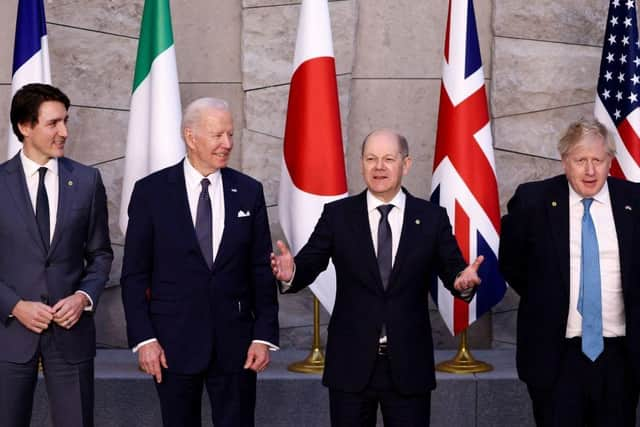European citizens want a quick end to war in Ukraine, poll finds ahead of G7 summit
The poll of ten countries, including the UK, from the European Council of Foreign Relations (ECFR) warned of a “growing gap” between foreign policy in European countries and the mood of their citizens. The survey found while Europeans are in solidarity with Ukraine, only in Poland is it the most popular view that punishing Russia for its aggression should be an immediate priority.
The results come as world leaders are gearing up for the G7 summit in Germany starting tomorrow, when the conflict in Ukraine is likely to be top of the agenda.
Advertisement
Hide AdAdvertisement
Hide AdIn the report, ‘Peace versus Justice: The coming European split over the war in Ukraine’, the ECFR identified three distinct ‘camps’ of European citizens with respect to the conflict – those that want “peace”, those that want “justice” and those that are “swing” voters, lying in between.


The countries surveyed included Poland and Romania, which both border conflict-hit Ukraine and are traditionally Russia-sceptic, as well as France, Germany, and Italy, which have previously earned reputations as Russlandverstehers (“Russia understanders”).
People were also questioned in Portugal and Spain, southern European states that have in the past generally been less involved in Russia policy; Finland and Sweden – northern European states that are applying for Nato membership as a result of the invasion – and Great Britain.
The report said: “The findings of the poll suggest that European public opinion is shifting and that the toughest days may lie ahead. The resilience of European democracies will mostly depend on the capacity of governments to sustain public support for policies that will ultimately bring pain to different social groups. This will force governments to balance the pursuit of European unity behind pressure on Moscow, with opinions that diverge both inside and among member states.
"The survey reveals a growing gap between the stated positions of many European governments and the public mood in their countries. The big looming divide is between those who want to end the war as quickly as possible and those who want to carry on fighting until Russia has been defeated.”
The report said European citizens were worried about the cost of economic sanctions and the threat of nuclear escalation, with the UK, Poland, Sweden and Romania most concerned about the threat of nuclear war. Unless something dramatically changes, the results indicated they will oppose a long and protracted war. Only in Poland, Germany, Sweden and Finland is there substantial public support for boosting military spending.
Russia is universally blamed for starting the conflict and is also seen as the biggest obstacle to peace. More than 80 per cent of respondents in Poland, Sweden, Finland and Great Britain hold Russia as the party responsible for this war – a view shared by strong majorities in Italy, France and Germany.
A comparable picture is also evident when asked about the chief blockage to a potential peace agreement, with a majority in every country citing Russia as the main obstacle.
Advertisement
Hide AdAdvertisement
Hide AdEuropeans also believe national governments should sever economic and cultural relations with Moscow and a prevailing view is also their country should cut off diplomatic ties with Russia. Sharp sanctions have already been implemented against Russia and its ally Belarus by most Western countries.
The G7 summit in Schloss Elmau in Bavaria will see a focus on dealing with the war in Ukraine – and subsequent rebuilding of the country – as well as the pandemic and environmental issues.
Germany took over the presidency on January 1, with the UK, France, Italy, Japan, Canada and the US all members.
The G7 website says the summit’s aims are to "progress towards an equitable world". It said the seven working sessions of the summit will focus on various topics: global economy, partnerships for developing countries, foreign and security policy, sustainability, food security, multilateralism and digital transformation.
Earlier this week, former United Nations secretary general Ban Ki Moon warned G7 leaders “have their hands full with urgent responsibilities” – and urged them not to neglect the threat of climate change.
He said: “Rising to these challenges requires following through on promises to achieve peace, protect public health and ease poverty. But it also means addressing a threat that both dwarfs and implicates all the others – climate change."
Last year, at the G7 conference in the UK, the leaders agreed to a pledge to raise $100bn [£81bn] a year to help low-income countries cut emissions. The funding was originally agreed in 2009, but has not yet been delivered, partly due to the Covid pandemic. They also committed to help nations move away from coal power, through methods including a plan to phase out coal burning unless it includes carbon capture technology.
The German presidency has also invited leaders from Argentina, India, Indonesia, Senegal and South Africa to take part in several working sessions during the summit, at the end of which the members are expected to adopt a “leaders' communiqué”, laying out conclusions from the summit. The European Union will also be represented by the President of the European Council, Charles Michel, and the President of the European Commission, Ursula von der Leyen.
From 1997, Russia became part of an expanded group called the G8, but was suspended in 2014, following its decision to annex Crimea and invade the Donbas region of Ukraine.
Comments
Want to join the conversation? Please or to comment on this article.
